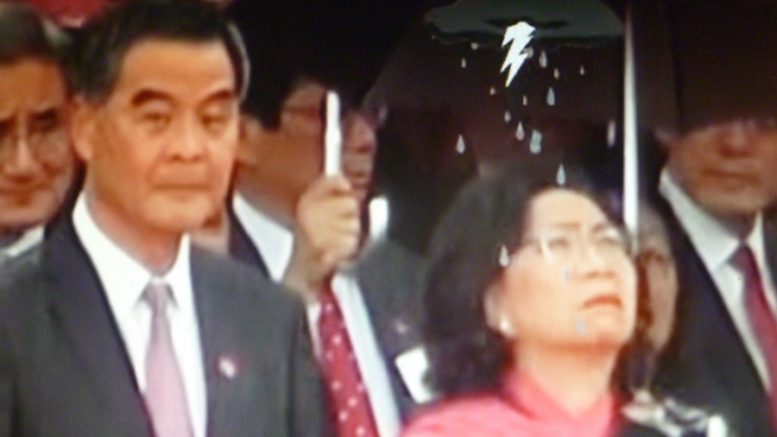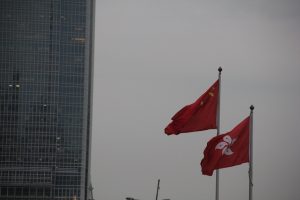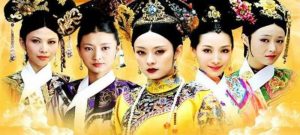By Wu Ruoqi –
In 188 BC, when the Han Emperor Han Huidi (漢惠帝) passed away prematurely at the age 23, his mother the formidable Empress Dowager Lv Hou’s (吕后)reaction confounded the court: she made a display of wailing loudly over the death of her only son, but literally did not shed a tear. A court official who knew Lv Hou well approached the Prime Minister and portended rough times ahead for him. His line of reasoning: “Lv Hou can’t bring herself to cry because her fear of losing her grip on power is outweighing her grief. The next in line to the throne is only a few years old, and therefore unlikely to exert effective control over veteran court officials. She therefore sees you as a threat. You should defuse the situation by naming male members of her maiden family to important positions at court.” The Prime Minister did so accordingly, and sure enough, Lv Hou, now assured of her continual influence over the empire, loosened up and bawled her eyes out.
Twenty-two centuries later, another mother of high political standing had her self-restraint tested: In 2012, Gu Liping (谷麗萍), wife of Ling Jihua(令計劃), then the right-hand man of the incumbent Chinese President, steeled herself into arriving at work in a business-as-usual mood a few hours after learning that her only son had died after crashing his Ferrari, seriously injuring in the process his two female passengers, one of whom was naked, the other, partially-clothed. If news of the accident leaked, the salacious gossip that would inevitably follow would blight her husband’s chances of ascending to the all-powerful Politburo Standing Committee.
In the past, I’ve had to take days off work after the death of a pet so that I could curl up and cry in private, so I don’t even deem myself to be in a position to imagine how a mother could prop up a facade of normality in the immediate aftermath of her child’s death. I became closer to being able to do so, however, when I came across a foil to the likes of Lv Hou and Gu Liping: when Regina Leung (梁唐青儀), wife of Hong Kong’s Chief Executive Leung Chun-ying, recently insisted to the press that her troubled 25 year-old daughter – whose unruly antics have continually provided fodder for the press – is in excellent health, flatly contradicting her unpopular husband’s earlier claim their daughter’s mental health has degenerated to the point where he must step down after his first term to take care of her.
Here was a political wife so goaded on by her most rudimentary instincts as a mother to protect her child – she couldn’t bear the thought of her baby being branded as a nutcase – that she didn’t seem to realize in making the statement, she was giving credence to the accusation of her husband’s many critics that he had been ordered by Beijing not to seek re-election and was simply using his daughter as a cover to save his face.

Leung Chai-yan, youngest daughter of Chief Executive Leung Chun-ying. Picture taken from her Facebook.
The late British journalist A A Gill said Africa holds particular attraction for him because examining the workings of the continent is like “seeing the world with the lid off.” Mrs Leung’s unwitting laying bare of her humanity did that for me, giving me a glimpse of the extent of the anguish Gu Liping and Lv Hou must have succeeded in suppressing only by an act of superhuman will. Had Mrs Leung been well-versed in Chinese history, however, she would have put her predicament in perspective and gotten a grip on herself, for Lv Hou had it far worse – there was that time when her husband Liu Bang (劉邦), fearing their two children were slowing down his chariot as he frantically tried to flee from the scene of a lost battle, sought to shove them off not once but three times. They survived only because the driver of the chariot grabbed them back each time they were pushed off.
For those who devote their lives to Chinese politics, getting a grip on oneself also extends to the physical domain. This occurred to me several years ago while I was covering an event as a reporter at a seaport in Shanghai: it was in the dead of winter, and all of us in the press stand were shivering despite being wrapped up in down jackets, so teeth-chattering were the blustery winds. Yu Zhengsheng (俞正聲), then the party secretary party of Shanghai, approached the podium with his retinue behind him, all of them clad in black suits with not a gloved hand in sight. Yu took a piece of paper out of his pocket and read his speech. I can still see in my mind the stark contrast in demeanor between the onstage lot and the rest: beneath the platform stood an audience of lesser mortals so preoccupied with putting up with the cold that before long they lacked even the presence of mind to follow the speech, while those on stage remained stiff and impassive, seemingly beyond the assault of the elements.
Because Yu Zhengsheng has established for me this yardstick of how Chinese officials should comport themselves in public come rain or shine, when I came back to Hong Kong after 10 years in China, I was struck when – again, courtesy of Mrs Leung – I was provided with a spectacle that was a far cry from the Yu Zhengsheng standard : it was raining hard at last year’s National Day commemoration ceremony, but as the band started playing the national anthem, Leung Chun-ying, who was sharing an umbrella with Mrs Leung, promptly followed Beijing representative Zhang Xiaoming’s (張曉明) lead in ditching the umbrella. Mrs Leung immediately paraded a frown on her face for all the see.
Yu Zhengsheng and his kind would have gotten a good laugh out of this scene. But they wouldn’t have been the only mainlanders amused by a Hong Kong person’s lack of guile: through Mrs Leung I got a sense of how I must have appeared to the mainlanders I once worked closely with. Despite a decade’s worth of effort in trying to prevent my face from showing my thoughts, my exertions were faltering at best – I could never do it in auto-pilot mode – so they could still see through me.
Mainlanders didn’t develop their toughness in a vacuum. For thousands of years their political tradition has failed to work out peaceful and predictable means to transfer power. This is why so much of Chinese history is about succession plans veering offtrack. And because the process of power transition is fraught with uncertainties, Chinese officials wear a mask to conceal their machinations from their opponents; one can’t climb up the ranks unless one has mastered the art of making out the intentions of those who are inscrutable.
The end result: the more powerful a mainland Chinese official is, the more difficult it is to read his expression and guess his thinking, for only those who are the toughest emerge at the upper echelons of the party.
This is how Gu Liping can just wake up one morning and rise to the occasion of arriving at work poker-faced a few hours after learning her son has died.
This is also why it’s so hard for democracy to take root in China. Hong Kong people tend to think of democracy as a one-person-one-vote issue, but from Beijing’s point of view, democracy is about being forced to be transparent. Is it therefore any surprise that it is perceived as anathema, given that much of Chinese rulers’ sense of security is derived from being able to play their cards close to their chest?
Westerners often remark on the inscrutability of the Chinese. What has been less remarked upon is ethnic Chinese who haven’t been born and bred in mainland China often find mainland Chinese inscrutable too. In the case of us Hong Kong people, add our ineptness in reading mainland officials to our inability to hide our feelings and we have in the making a very unequal playing field: we are an open book to mainland officials but they are a closed book to us, a state of affairs that doesn’t bode well for our endeavours to negotiate for a greater autonomy.
The first step towards tilting the balance slightly more in our favour would be to consciously cultivate the ability step outside our own heads and look at ourselves the way mainland officials look at us. Here is where familiarity with Chinese history can be useful. If the way Chinese rulers relate to each other and to their subjects hasn’t changed for thousands of years, then we can gain a heightened awareness of our blind spots by scanning Chinese history for characters who can reflect the error of our ways back to us.
Lv Hou’s one-time arch enemy – her husband’s most-beloved concubine Qi Furen (戚夫人) – is a cautionary tale on the perils of only being able to see things from one’s point of view. An exquisite beauty gifted in singing and dancing, Qi Furen’s comeliness eventually became her undoing. It is telling that in the 10-plus years during which she reigned as Liu Bang’s undisputed favourite, while history did mention Qi Furen had several hundreds maids attending to her needs, it never recorded her forming alliances with court officials. Chances are therefore that early on she had already displayed a dismal lack of political sense, so she was uniformly perceived as too risky to ever bet one’s fortunes on.
In any case, Qi Furen’s perception of herself was very different. Imagine you are her for a moment. You wake up every morning and see a lovely face looking back at you in the mirror. You look at Lv Hou , look past her senior rank, and all you can see is an older woman whose husband – the same man who is so besotted with you – cared so little for that back in the days when he was a fugitive, he left her to languish in prison not once but twice, pushed the children he had with her off his chariot as he was fleeing from a battlefield not once but thrice. So, convinced of your invincibility, you make a bid to replace Lv Hou’s son with yours as the rightful heir, unaware that Lv Hou, whose antenna for potential threats has been sharpened by her misfortunes as an unloved wife, has been anticipating your move. While you were basking in her husband’s affections, she has been assiduously cultivating her power base and making herself indispensable to Liu Bang by doing dirty jobs for him, such as finishing off the generals his scruples kept him from killing directly. So, when you tried to seize the throne for your son, court opinion rallied to Lv Hou’s side, and Liu Bang was unable to act on your wish.
Now, upon Liu Bang’s death, Lv Hou keeps you in the palace but sentences you to the hard labour of grain-grinding. Disoriented by your rapid fall from grace, you lose your sense of proportion; instead of feeling grateful for being allowed to live, you think it’s the end of the world that you have to do grunt work . So you let off steam by singing a song – whose lyrics you composed – in which you mentally address your son, who’s far away presiding over his own kingdom: “Son as duke, mother as slave, grinding grain from sunrise to sunset with my life hanging by a thread. A distance of 3000 miles, who can make my situation known to you?” (子為王,母為虜。終日舂薄暮,常與死為伍,相離三千裏, 當誰使告汝). You’re re too consumed by your emotions to pay heed to how the ever paranoid Lv Hou would interpret your lyrics – as she sees it, you’re asking your son to convene an army, invade the capital and save his mother.
When word of Qi Furen’s lyrics reached Lv Hou, she swiftly schemed to get Qi Furen’s son killed. As for Qi furen, Lv Hou cut off all her limbs, gouged out her eyes, administered poison to render her deaf and mute, and left her to expire slowly in the latrine.
The thing that commanded my attention even more than the gruesome manner of Qi Furen’s death was the way sufferings can change a person for the worse, making her suspicious and vicious in ways that are inconceivable to a one who has led a sheltered, coddled existence. Qi Furen’s vulnerability stemmed from her lack of awareness of her vulnerability in the face of someone like Lv Hou.
The way a particular scene from history becomes personally relevant is it will first lay dormant somewhere at the back of your mind for the longest time, only to emerge when a real-life situation on which it has bearing occurs. And so I suddenly remembered Qi Furen one day, when a mainland person I once worked for made an offhand comment about me to other mainlanders at the end of a casual meal of lunchboxes: “She has left unfinished pieces of meat in her lunchbox because unlike us, she has never known hunger, has never known meat as a scarce commodity.” Immediately alarm bells rang in my head. Working for him hadn’t been pleasant, and for a while already I had the feeling that he must have endured belittling treatment at the hands of those whose patronage he needed in order to climb his way up; his liking for bullying his staff, I reasoned, was his twisted way of releasing his pent-up rage at his past tormentors. But this was the first time it dawned on me how I must have appeared to him: probably more or less the way Qi Furen came across to the court officials who quickly deemed her too naive a target to form an alliance with, a person whose smooth sailing in life has left her unacquainted with the dark side of human nature. I made a mental note to never cross my mainland boss because I was not in a position to imagine what those who have been through a lot in life were capable of.
Come to think of it, the Qi Furen story can apply to Mrs Leung, too. I haven’t found any reports on Mrs Leung telling the press she has the habit of reading up on Chinese history and using it to guide her thinking, but had she mulled on the Qi Furen story, she would have thought twice about letting people know she minded being wet at the National Day remembrance event. Qi Furen thought she was merely getting her grievances off her chest when she sang the song that led to her grisly end; it didn’t occur to her that because of her identity her lyrics had political implications. Likewise, Mrs Leung seems oblivious to the way her public outbursts may lower her husband’s standing in the eyes of Beijing. There is hardly a thing that reveals more of a man than his choice of wife, so Beijing may interpret her failure to rein in herself as his failure to rein in her.
The beauty and excitement of Chinese history is for every Qi Furen you have someone with the savvy of the prime minister advisor who could infer from Lv Hou’s failure to produce tears at the death of her son that the Prime Minister’s life was in danger. With such an eye-popping assemblage of positive and negative examples for us to meditate on, the claim – frequently put forward by those from the democratic camp – that the study of Chinese history compromises one’s ability to think critically is patently absurd. What’s more conducive to independent thinking than using historical figures to enable us to look at ourselves from the outside and get a clear view of our slip-ups?
My suggestion that we go forward by looking backwards was inspired by Fudan University Professor in International Relations Tang Shiping’s (唐世平)plea to mainlanders that they should read more of world history and less of Chinese history, whose main theme, as Tang sees it, is “plotting and trickery” (權謀術是貫穿整個中國歷史的核心主線)and therefore has little application if China wants to be a true global player in the 21st century. To Tang, a sign that China is still stuck in the ancient mindset is the recent popularity of period dramas that prominently feature political intrigues in their plots. “Surely China can’t both indulge in her taste for ‘The Legend of Zhen Huan’ (甄嬛傳) and ‘The Empress of China’ (武媚娘)and get along with the modern world?” (中國不能還是品著 《甄嬛傳》 和《武媚娘》來和現代世界相處吧?)
Tang’s reading of his nation’s pulse has implications for Hong Kong. Deng Xiaoping’s original rationale for leaving the territory’s way of life unchanged for 50 years was to give China a time window to modernise itself, so that its economy can be on the par with Hong Kong and other developed countries by the end of the period. A China that is still obsessed with “The Legend of Zhen Huan” and “The Empress of China” 20 years into the 50-year time-frame may mean Deng had been too optimistic in his projection. It also means – in case another 30 years go by and China remains consumed by plotting and trickery – it’s high time for us to work on mentally meeting mainlanders midway. Here is where Chinese history can come in handy; it can provide what I call a wiretapping service. I tapped into this function when I used Qi Furen to help me clarify how my inscrutable mainland boss viewed me.
Hong Kong people can likewise work on deciphering the thinking pattern behind those inscrutable faces of mainland officials by using Chinese history this way.
A chance remark made by a mainland friend at the time of Occupy Central made me realise the urgency and enormity of the task that Hong Kong has in cultivating a more nuanced understanding of China : “The Chinese Communist Party has been playing politics since the 1920s. I can’t believe the young people of Hong Kong would consider themselves capable of playing politics with the CCP as their adversary.”
All at once I saw how he would see things this way. We have people who are immediately receptive to Haruki Murakami’s idea of comparing authoritarian regimes to walls and individuals to eggs, and can only think of the Hong Kong-Beijing relationship in terms of eggs versus the wall. More often than not, these are the same people who automatically equate the study of Chinese history with brainwashing. If Chinese history has taught me one thing, it is that court politics is the stomping ground for only the most hardened. You wouldn’t want to find yourself playing against someone like Yu Zhengsheng, who, by the way, in addition to being impervious to the cold, has survived the death of 6-7 family members during the Cultural Revolution, and has managed to thrive in politics despite the defection of a brother to the U.S. as a spy. We do ourselves no favour if we focus on China’s failure in playing catch up with us but not on our part in not playing catching up with them.
Educated at the Diocesan Girls’ School and Oxford, Wu Ruoqi lived in mainland China and worked in the PR and media sectors for a decade before returning to Hong Kong. She is now working on a book on Chinese astrology and coaching senior school students on English composition, as well as writing about the complexities of being Chinese in post-colonial Hong Kong on the side. She can be reached at [email protected]
Photos: VOHK pictures and pictures taken from Apple Daily website and Leung Chai-yan Facebook




Be the first to comment on "A Han Dynasty history lesson for wife of C Y Leung"